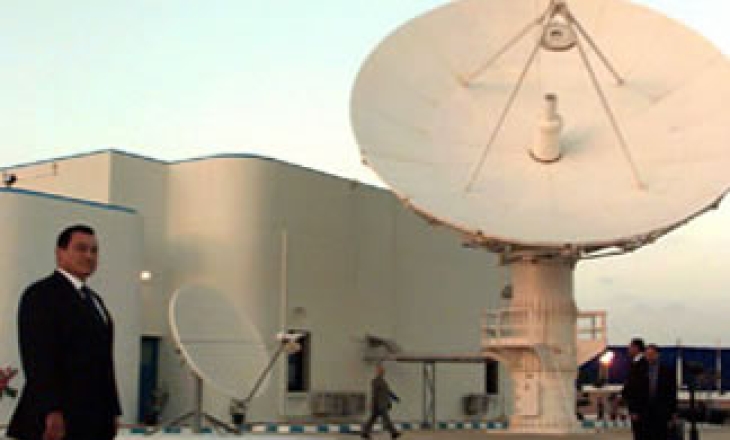The Arabic Charter on Satellite has claimed another victim. Nilesat, an Egyptian government-owned satellite transmission company, stopped carrying the London-based Al-Hewar Television channel on April 1 without warning or explanation. The station remains accessible to viewers on the Atlantic Bird satellite system, according to the New York-based Committee to Protect Journalists (CPJ).
In a letter to Amin Bassiouni, Nilesat Chairman, CPJ Executive Director Joel Simon said, "The public silence of your company, coupled with the recently promulgated Arab Information Ministers’ charter on satellite broadcasting, has prompted speculation that the decision comes in retaliation for the station’s critical reporting on Egyptian and Arab world politics.
"The Arab Information Ministers’ charter, adopted in February, calls for vague bans on broadcasting that has a 'negative influence on social peace and national unity,' that is 'in contradiction with the principles of Arab solidarity” or that defames Arab “leaders or national and religious symbols'."
"Such an act is a clear indication of the intention of the Egyptian government to go ahead with implementation of the Arabic Charter on Satellite, endorsed by the Arab information ministers. This is the latest in a series of attacks in Egypt against freedom of the press and the free flow of information. Egypt is on a roll. But it is going downhill," said Agnes Callamard, ARTICLE19’s Executive Director.
"We knew about the wrathful censorship, even hidden, on some space channels specially the Egyptian ones", said Gamal Eid, Executive Director of the Arabic Network for Human Rights Information (HRInfo). "Banning the channel is a cruel start of the Arab information ministers' document. Only in the Arab world, the dwarf authorities such as information ministers can control TV channels. It is a mere Arabic scandal."
Zaher Birawi, Al-Hewar TV’s programme director, called Nilesat’s move “surprising” and “unjustified.” Al-Hewar TV said in a statement that it might be linked to “the dissatisfaction of the Egyptian government with the high level of freedom with which the channel tackles different issues, particularly those related to the situation in Egypt.”
Al-Hewar features talk shows such as 'Peoples’ Rights', which often invites human rights activists harassed or persecuted by Arab governments, and 'Egyptian Papers', which has hosted prominent Egyptian government critics such as editor Ibrahim Eissa and dissident judge Hisham Bastawissi.
Last week, the Egyptian daily Al-Dustour quoted Al-Hewar’s lead shareholder Azzam Tamimi as saying that the Nilesat decision could also be related to the channel’s coverage of popular support for Palestinians under siege in the Gaza Strip—stories that highlighted inaction on the part of Arab states and Egypt.
The secretive closure of Al-Hewar TV bears the markings of censorship and poses a grave threat to the free flow of information, Simon said, and called on Bassiouni to publicly clarify the reasons for terminating Al-Hewar TV’s signal and see to it that the station is able to resume broadcasting immediately.
ARTICLE 19 once again condemned the Arabic Charter on Satellite which stands in opposition to Article 32 of the Arab Charter on Human Rights that guarantees the right to information and freedom of expression. The charter was agreed on February 12, 2008 at a special meeting of Ministers of Information of the Arab League states in Cairo held at the request of Egypt and Saudi Arabia. With the exception of Qatar and Lebanon, member states of the Arab League voted in favour of the non-binding document.
Although not legally binding, the document is a symbolic blow to freedom of expression and a regional attempt by Arab governments to restrict Satellite TV, the only avenue for free expression in most of the Arab World. The document is particularly dangerous in that it threatens to "withdraw, freeze or not renew the work permits of media which break the regulations."
"Stations are required not to offend the leaders or national and religious symbols in the Arab world…not to damage social harmony, national unity, public order or traditional values…to conform with the religious and ethical values of Arab society and take account of its family structure…refrain from broadcasting anything which calls into question God, the monotheistic religions, the prophets, sects or symbols of the various religious communities…and protect Arab identity from the harmful effects of globalisation”, are some of the vague provisions in the document which if implemented will inevitably mute all forms of political expression and hinder the only avenue for free expression in the region-satellite TV.
In March 2008, the Lebanese National Audio-Visual Council objected to the ‘Principles for Organizing Satellite TV in the Arab World’ charter. In the same month, 34 Arab human rights organisations issued a statement declaring their “total rejection” of the document that aims to impose new restrictions on the Arab Satellite channels. According to the statement “the charter contains statements that correspond to the same charges targeting opponents of the Arab governments”.










